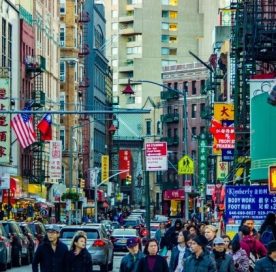How AI serves a transforming role in dining for global travelers: Technology, which holds sway over the day-to-day activities of life, is playing a great transforming role in global dining—right from personalized recommendations to well-planned reservations; AI is transforming the culinary journey all across the globe.
Hence, the future of travel looks immensely bright! This is how.
New advances in AI hold the power and potential to change the way guests experience a wide variety of food options globally. In the food and travel industries, we have only just opened our doors to how data can bring taste to life and better serve guests.
How this cutting-edge technology enhances dining experiences across the globe is what follows.
AI in Global Travel Dining

AI has changed everything about the travel sector. With 54% of travelers now comfortable with AI recommendations in dining and attractions, this is technology at widespread acceptance. There was an increased usage seen in AI-driven virtual tours when pandemic-related travel restrictions were imposed recently, which was indicative of the growing reliance on AI-driven solutions within the sector.
It’s not about ease; the role of AI in dining is one of memorable, personalized encounters unique to the traveling individual. We will further explain below how AI-enhanced dining drives a revolution in how the global travel gastronomy business is going.
The Growing Impact of AI on Travel Industry Revenue
Artificial intelligence has been influential on the revenues in the travel industry in recent years. According to Statista, the share of revenues influenced by AI to travel companies worldwide surged from 9 percent in 2018 to 32 percent in 2024. This dramatic increase within just three years underlines how fast the adoption and impact of AI technologies in the travel sector have been, including dining experiences.
As AI enhances various facets of travel, from personalized recommendations to operational efficiencies, its influence on revenue streams within the industry looks set to be here to stay.
AI-powered Personalized Dining Experience
Another deep impact AI can make in travel dining is a highly personalized experience. AI systems such as those can analyze past dining experiences, dietary restrictions, and food preferences to tailor recommendations for the traveler. This depth of personalization can raise the bar on customer satisfaction once again, AI-driven recommendations can boost customer satisfaction.
One especially fine example of this is developing an AI-based advanced platform to break language barriers for smooth restaurant interactions and easy reservations in different languages. Slang.ai empowers travelers to make reservations in different languages at the click of a button, thus making eating out smoother and more enjoyable. With this, restaurant reservations can be streamlined for easier and more efficient than ever.
AI algorithms can sample your history of dining choices and understand taste preferences, amplifying those with any dietary restrictions or allergies one may have. They have the autonomy to provide local cuisine that respects the users’ cultural or religious practices and recommend dining options within the budget without compromising on quality.
It is through platforms that this revolution becomes possible, which proposes personalized dining itineraries that understand the profile of each traveler. Such AI-driven platforms not only save time but expose travelers to food experiences that might otherwise have been missed.
AI-Powered Booking Systems and Reservation Systems
Thanks to AI, such days of fighting, a language barrier, or across time zones to secure a table are quickly fading into memory. AI-powered reservation systems are making it simple for global travelers to secure their spots at the most coveted dining venues.
AI-driven reservation systems return instant confirmations; no need to search for email responses or call back. They have multilingual customer support for reservations easy to keep across languages. These can integrate with your travel plans to suggest the best dining times and locations and feature smart waitlist management that automatically puts you on a waitlist and notifies you once open at your favorite restaurant.
These systems are so efficient that AI chatbots posted on travel websites reduce customer service costs for the company and, at the same time, provide 24-hour assistance to the traveler.
Improving the Dining Experience & Future Of Travel
Its influence does not stop at the planning phase but extends to enhancing the dining experience as a traveler. From virtual reality previews of menus to local dining spots recommended by AI, technology is taking how we experience food in foreign lands into new dimensions.
AI-enhanced on-site dining features include virtual reality previews of menu items before ordering, which can reduce disappointment with its real counterpart. Real-time translation applications will help guests communicate smoothly not only with staff but also with the understanding of menus in different languages. Added to this, augmented reality will be in a position to give nutritional information or even ingredient details related to your meal for an improved experience in dining.
These technological changes are key differences, so travelers have attested over time that part of the improvement in travel experiences entails having personalized itineraries with dining recommendations.
Operational Improvements in Hospitality

Behind the scenes, AI is innovating how restaurants and hotels conduct business, ultimately improving dining experiences for travelers across the world. From inventory management or staff scheduling, AI fine-tunes these aspects of hospitality. In restaurants:
- Inventory Management: AI predicts demand, as one can obtain fresh ingredients through the correct management of stock levels.
- Staffing: A trained waiting list and staff scheduling for busy periods so that orders are served promptly.
- Improved Customer Experience: Inquiries and reservations are done through AI, hence clearing the staff to handle people who are present in the restaurant.
- Predictive Maintenance: AI systems can detect when kitchen equipment may need some maintenance to fix, preventing sudden breakdowns.
The application scope of AI in the hospitality sector is humongous; now, hotels use AI to optimize the allocation of resources and enhance the experience for guests. All of these back-of-house efficiencies add up to more seamless and enjoyable dining experiences for travelers.
Safety and Security Enhancements
With health and safety concerns at the top of the agenda in today’s environment, AI is right at the heart of ensuring safe dining experiences for travelers worldwide. From monitoring health protocols to updates in real-time on local dining conditions, AI leads the way when it comes to travel safety.
AI-driven safety measures ensure health protocol monitoring in restaurants so that they adhere to regional health stipulations, besides real-time safety updates, keeping travelers informed of any issues in their dining area. Touchless payment systems facilitate contactless interactions to reduce the amount of personal contact required, while AI takes care of restaurant capacity management to make sure that social distancing measures are effectively realized.
The role of AI in making travel safe does not stop at dining. For example, facial recognition technology, powered by AI, is accelerating check-ins at airports, reducing waiting time, and minimizing crowding in an enclosed space.
The Future of AI in Travel Dining

The potential of AI in travel dining is vast as we gaze into the future. With customer interactions in the travel and hospitality sectors going hands-free by 2025, we are entering a new frontier in travel dining.
- Personalization of Menus: Restaurants would bend to the palate and needs of every diner through menus that can be tailored to preferred or special diets.
- AI-Powered Cooking Assistants: Consistency in cooking the food would happen through AI-owered robotic chefs.
- Predictive Dining Experiences: AI reads your dining aspirations before you even know what you want.
- Immersive Dining Technologies: Virtual and augmented reality can turn any dining environment into any ambiance, whatsoever.
In a nutshell, the dining experience has changed to be much more engaging, personalized, and memorable for global travelers.
FAQs:
AI helps restaurants by predicting busy times for better staffing and inventory. Chatbots handle customer queries, while kitchen robots speed up food prep. AI also personalized marketing, analyzes food trends, and manages delivery services, saving time, reducing waste, and enhancing the customer experience.
AI benefits the food industry beyond restaurants by predicting crop yields, managing irrigation, and improving quality control in food processing. It helps create new products, optimizes supply chains, and manages grocery store inventory. AI tracks food from farm to table for safety and suggests personalized meal plans for better nutrition. These applications make the food industry more efficient and responsive to customer needs.
AI improves restaurant experiences by powering menu recommendations based on managing reservations and waitlists and helping staff prioritize tasks. It enables voice interaction at drive-throughs and personalized loyalty programs. For takeout, AI optimizes delivery routes and analyzes feedback for service improvements, making dining out more enjoyable and convenient.
Conclusion
AI is disrupting global travel dining, facilitating improvements at every step of the culinary journey, from personalization of recommendations and smooth booking to improved on-site experiences, enhanced safety measures, and so much more. We foresee that with developing technology, even more exciting solutions will come to set global travelers’ dining experiences onto a new level.
The fusion of AI and traditional hospitality thus gives way to a new age in travel dining—faster, personified, and delightful. Such a culinary revolution promises unforgettable meals, tailored to each of the travelers.
AI technology thus means not only looking forward to meals but tailor-made cuisine excursions. Further down the line, the relationship between AI and travel dining will continue to evolve, promising much more exciting developments in this space.
Read Also:













